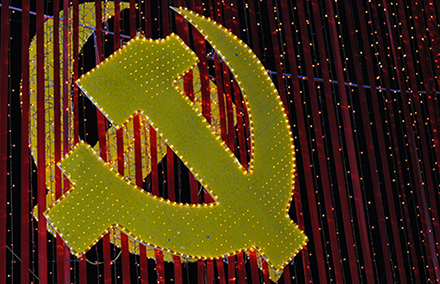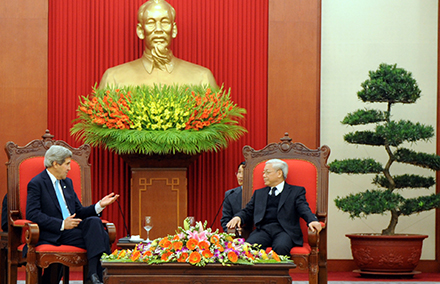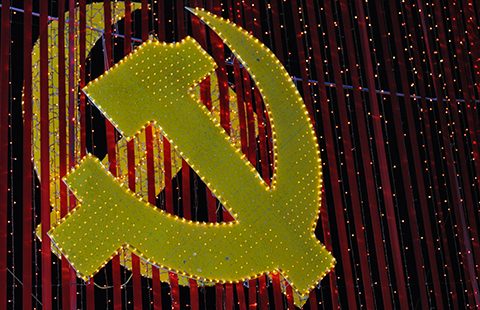
Photo: carawah on flickr https://www.flickr.com/photos/carawah/
There are clear changes in substance and style to Vietnam’s normally secretive politics as leaders prepare for the 12th party congress.
Although Vietnamese politics are incredibly opaque, much – though not all – of the leadership selection for the 12th Congress of the Vietnam Communist Party (VCP) appears to be gelling.
The Central Committee is currently holding its 12th Plenum to finalise their leadership selection. The quinquennial event, to be held in the first quarter of 2016, will put in place a new leadership at both the national and provincial level, and endorse a new political platform. The draft Political Report has been released for public comment.
Carl Thayer has previously noted that there have been some important procedural changes that would limit congress delegates to nominating Central Committee members from the floor, undermining the carefully negotiated personnel choices hammered out by the outgoing Central Committee and Politburo behind closed doors.
Prime Minister Nguyс╗Еn Tс║еn D┼йng appears poised to become the next General Secretary, though he would require an age waiver; he has the support of the Central Committee, and he enters the 12th Plenum in a very strong position with the passage of the Transpacific Partnership (TPP).
Dung’s protege Deputy Prime Minister Nguyс╗Еn Xu├вn Ph├║c, is likely to succeed him; Nguyс╗Еn Thс╗Л Kim Ng├вn, the vice chairwoman of the National Assembly is set to lead the legislature, though some view her as a strong candidate to become prime minister.
And because so many incumbent politburo members are set to retire due to age and term limits, there will likely be a waiver for at least one additional incumbent member as president or general secretary should D┼йng not get the nod.
While ideological conservatives have not given up the fight, they appear unable to muster sufficient opposition to D┼йng, whose forceful stance on Chinese aggression in the South China Sea, and in particular the placing of the HY981 oil rig on Vietnam’s continental shelf in mid-2014, economic reform agenda, and support for the TPP have carried the day within the party.
Indeed, General Secretary Nguyс╗Еn Ph├║ Trс╗Нng, himself on the conservative end of the political spectrum, spoke of his support for the TPP and repeatedly called on the US government to recognise Vietnam as a market economy during his unprecedented trip to the United States and historic meeting with President Obama in July.
The crippling debates between communist ideologues and reformers that have frequently hampered growth and kept Vietnam in a purgatory between the plan and the market, are largely over.
Of course there will be resistance to reforms, but increasingly based on vested interests and rent seeking, not necessarily ideology. For example, the latest attack on Vietnam’s free trade agreements has been based on lost tax revenue.

Communist Party General Secretary Nguyen Phu Trong (right) meets with US Secretary of State John Kerry. Photo: US Department of State/ Wikimedia commons
The leadership elected at the 12th Congress will continue a trend of electing younger, better educated and more professional individuals. One cannot join the Central Committee by being a mere party functionary. But there are three other trends that are important markers for Vietnam’s political development.
The first is that economic management experience is now a prerequisite for senior leadership position. Four expected members of the politburo have extensive economic experience. Trс║зn ─Рс║бi Quang, currently the Minister of Public Security, who is appears to being groomed to take a top party position at the 13th Congress in 2021, is likely to become the party chief of Hс╗У Ch├н Minh City, the country’s economic hub, broadening his experience beyond internal security.
Second, there has never been greater emphasis on professionalism. Party fealty is necessary, but insufficient.
While the leadership is not comprised of engineering technocrats as in China, managerial competence is essential. For example, Ph├║c has received plaudits for his economic stewardship and pulling the economy out of a slowdown.
Indeed Vietnam’s current 6.8 per cent growth is the highest in the region. Quang is seen as a very competent and professional head of internal security, who has helped put in place some important reforms, while maintaining firm party control amid a surge in online platforms for dissent.
But increasingly top leaders are expected to have experience managing several complex sectors. Nguyс╗Еn Thiс╗Зn Nh├вn has extensive economic experience, but was handed the leadership of the Vietnam Fatherland Front, the party’s umbrella organisation that oversees all civil society organisations.
It’s a very difficult job that entails keeping a lid on Vietnam’s burgeoning civil society, including unions, all official religions, and associations. Nh├вn has received credit for having helped defuse an unprecedented labor unrest that wracked the country in March and April.
The National Assembly has now held two annual votes of confidence (with “no confidence” not being an option). In 2014, Nguyс╗Еn Thс╗Л Kim Ng├вn received the most “high confidence” votes (80.4 per cent) of the 50 evaluated officials. Ph├║c also fared well garnering 73 per cent “high confidence” votes.
D┼йng’s candidacy for General Secretary has only been possible after he reversed his dismal evaluation in the 2013 confidence vote. That year, he received the lowest rating in the National Assembly’s first vote of confidence, garnering 32 per cent “low confidence” votes.
Yet in 2014, 64 per cent of lawmakers gave him “high confidence” and only 14 per cent “low confidence.” Some of that swing could have been driven by concern that if he was panned for a second year, it would strengthen the hand of conservatives and make him ineligible for promotion.
The results of the two confidence votes show that officials are increasingly evaluated based on their performances, not blind party loyalty. While the vote is not a popular referendum, its results are made public in real time and the National Assembly enjoys high popular legitimacy among the general population.
There is some evidence that National Assembly members reflect public perception of leaders’ performance in their own votes. Leaders pilloried by the public, do not emerge from the National Assembly votes unscathed.
Third, while Vietnamese leaders come to power through a secretive and opaque process, with no public input, there are changes on the margins. Leading candidates for top positions are more exposed or even educated in the West and far more charismatic.
More importantly, they have acknowledged the need for a degree of popular legitimacy and greater responsiveness. Vietnamese do not want to be ruled by faceless party hacks whom they learn about only if things go very poorly (such as with Nguyс╗Еn Thс╗Л Kim Tiến, the current Minister of Health), and increasingly through the Internet from scandal (such as the website, Portraits of Power).
Nguyс╗Еn B├б Thanh, the recently deceased former party chief of ─Р├а Nс║╡ng, set the mold for the new style of Vietnamese leaders. He was known for his pragmatic, take charge, and accessible leadership style. He communicated well with the media; most leaders in Vietnam do not. But most of all, he was down to earth, not aloof like most of the leadership.
Another example of this emerging trend is Deputy Prime Minister V┼й ─Рс╗йc ─Рam. Though widely seen as too young and too close to D┼йng to be elected to the politburo at the 12th Congress, the Western-educated, competent, and poised ─Рam has an unusual common touch and is known to be very media-savvy.
He has received intense coverage in social media, which is how more and more Vietnamese get their news. ─Рam could be given additional responsibilities and would be a strong candidate to join the politburo in 2021, if not before then, in a mid-term appointment.
Politics in Vietnam remain both secretive and driven by a desire for continuity. The party tolerates no dissent and continues to maintain its monopoly of power. But even within those confines, there are changes in style that will have an impact on substance.
The next generation of leaders is increasingly more media savvy and cognisant of their need to be publicly accountable. And while there is still time to make changes and conservatives can be expected to push back, the personnel selections to date auger well for deepened economic reform and integration with the West.
Perhaps more importantly, they suggest important changes in leadership style, which will have an important impact on Vietnam’s medium-term political development.
Zachary Abuza is a professor at the National War College where he focuses on Southeast Asian politics and security issues.
 Facebook
Facebook  Twitter
Twitter  Soundcloud
Soundcloud  Youtube
Youtube  Rss
Rss 